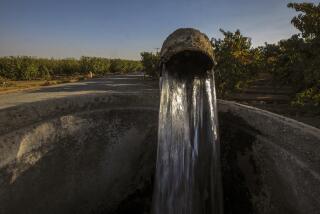O.C. to Boost Fresh Water Aquifer
Plans to protect and replenish Orange County’s vast underground supply of fresh water advanced this week when government officials approved construction of a $292-million filtration plant that will process treated sewage before it is injected into the reservoir.
The Orange County Sanitation District board of directors Wednesday night unanimously approved the project, which is designed to increase supplies of clean water for the county’s groundwater basin and halt -- or even push back -- the advancing ocean that threatens to contaminate the resource.
For decades, the basin has been plagued by saltwater that flows in as fresh water is pumped from underground reservoirs along the coast. The condition can be checked and reduced by pumping treated water back into the ground to act as a shield.
“This is the single most important project I will be involved in during my career as a civil engineer,” said Blake Anderson, general manager of the sanitation district. “It will provide a needed resource for a large part of Orange County.”
Fed by rain and runoff from the Santa Ana River watershed, the groundwater basin provides about half the water needs of 2.3 million people in central, northern and coastal Orange County.
Basin supplies are pumped from the ground, filtered and distributed by the Orange County Water District, which is a partner of the sanitation district in the new plant and related groundwater projects. Water district board members approved the facility last week.
With a capacity of 86 million gallons a day, the new plant in Fountain Valley will take treated sewage from the sanitation district and filter it further until it is similar in quality to distilled water.
The system relies on 270 million micro-filters -- thin straws of porous material with holes no bigger than three-hundredths the thickness of a human hair. They are designed to remove bacteria and viruses.
From there, the water passes through another series of membranes to remove chemicals, carcinogens, fertilizers, pesticides, toxic metals and minerals.
Finally, the water is disinfected and pumped into the groundwater basin, where it is further cleansed as it percolates through the earth to various depths up to 1,000 feet.
“We will put this water into the groundwater basin and mix it with native groundwater,” said Virginia Grebbien, general manager of the water district. “We want to make darn sure it’s the highest quality possible.”
The district plans to pump about 40 million gallons a day into the county’s saltwater intrusion barrier through a string of 26 wells in Fountain Valley and Huntington Beach. The barrier is essentially an underground wall of water that blocks the ocean from seeping into the basin.
Another 32 million gallons a day will be piped to the groundwater recharge basin in Anaheim. The water will be used to meet future demand as the county reduces its reliance on outside sources, such as the Colorado River.
The water district now pumps about 15 million gallons a day into the saltwater barrier using supplies from an aging facility known as Water Factory 21. The 1970s facility will be replaced by the new plant, which is scheduled to be finished in July 2007.
The project “is going to ensure long-term water reliability for the residents of Orange County, and it will provide about 20% of the county’s future water supply,” said Denis Bilodeau, president of the water district board of directors.
The treatment plant represents the heart of a $486-million project to overhaul and expand the county’s outdated groundwater replenishment system.
Plans include a new 66-inch pipeline that will run 13 miles from the water district’s Fountain Valley headquarters to the groundwater recharge basin in Anaheim.
District officials also want to build 16 more injection wells along the saltwater curtain as well as related pipelines to bring treated water from the new plant to the barrier.
More to Read
Sign up for Essential California
The most important California stories and recommendations in your inbox every morning.
You may occasionally receive promotional content from the Los Angeles Times.











